Agios Nikolaos, Chalkidiki
| Agios Nikolaos Άγιος Νικόλαος | |
|---|---|
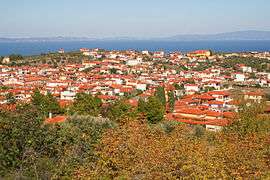 | |
 Agios Nikolaos | |
| Coordinates: 40°14.9′N 23°41.6′E / 40.2483°N 23.6933°ECoordinates: 40°14.9′N 23°41.6′E / 40.2483°N 23.6933°E | |
| Country | Greece |
| Administrative region | Central Macedonia |
| Regional unit | Chalkidiki |
| Municipality | Sithonia |
| Municipal unit | Sithonia |
| Elevation | 90 m (300 ft) |
| Population (2011)[1] | |
| • Rural | 1,714 |
| Community[1] | |
| • Population | 1,895 (2011) |
| Time zone | EET (UTC+2) |
| • Summer (DST) | EEST (UTC+3) |
| Postal code | 630 78 |
| Area code(s) | 23750 |
| Vehicle registration | XK |
Agios Nikolaos (Greek: Άγιος Νικόλαος, meaning Saint Nicholas) is a village located 120 kilometers south-east from Thessaloniki on the Chalkidiki peninsula in Macedonia, Greece.
Location
Agios Nikolaos sits on the north-eastern top of Sithonia peninsula, smallest east-west diameter of Sithonia.
Geography
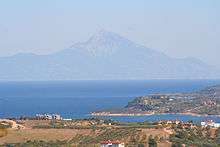
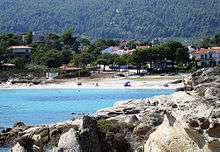
The village Agios Nikolaos itself is closest to the sea of (Singitikos Gulf, Pyrgos Beach) approximately 1,5 km. away. However, its territory is quite extensive. To the north-east it borders the village of Pyrgadikia at Salonikiou Beach (8 km from Agios Nikolaos). To the north it borders the village of Metangitsi. In the west and south-west it is neighboring the village of Nikiti. To the south it runs up to Armenistis Beach, which is a part of the village of Sarti (approx. 18–20 km from Agios Nikolaos).
Landscapes
Agios Nikolaos' landscapes show a substantial variability.
In the plains east and south-east of the village agriculture predominates with olive trees as the main cultivated plant. Forests are lacking. Toward the south, the Itamos mountain range of Sithonia gain height, and is completely covered with forest. Towards its northeastern extension (Salonikiou Beach) significant parts of the village territory is covered with forests. In all parts of the village territory plains or smooth hill segments are devoted to agriculture.
On the beaches there are hotels and pensions as well as individual homes that have been built since the 1980s.
The highest point within Agios Nikolaos territory is mount Karvounas (height approx. 550 m) in the south-west (Vourvourvou).
Settlements
A couple of settlements do belong to Agios Nikolaos, as there are:
- Vourvourou – located 10 km south-east. Vourvourou is village near Agios Nikolaos, in the Chalkidiki peninsula of northern Greece. It is best known as a holiday destination. Close to Vourvourou are the settlements of Karidi and Fteroti. Diasporos island is very close to Vourvourou.
- Salonikiou Beach – located 8 km north-east. Akti Salonikiou is the area around the beach of Salonikiou on the northeast coast of Sithonia, between Ormos Panagias and Pyrgadikia. The closest village is Metangitsi (4 km, in the mountain). Most of the buildings in the region are private villas but there are some studios and apartments to rent. The beach is more than 1 km long, with 5 то 25 meters width.
- Ormos Panagias – located 4 km east/south-east, serving as the villages port. Ormos Panagias is an important port for Sithonia, Halkidiki. Considered as being a part of Agios Nikolaos, the port of Ormos Panagias is located just a few kilometres to the south. The amount of accommodation and restaurants that have collected around this harbour has made it grow into somewhat of its own village built around an existing old church. Even though it’s not officially recognized as a village, Ormos Panagias is considered a Halkidiki resort in its own right that attracts many people.
Administration
Agios Nikolaos was an independent municipality. In 2001 widespread rearrangement of Greek local administrative divisions was undertaken. This resulted in Agios Nikolaos being combined with the municipality of Sithonia and with the villages of Nikiti, Neos Marmaras, and Metangitsi.
Population
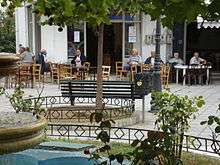
Agios Nikolaos has 1,714 inhabitants (based on the core village of Agios Nikolaos). Including the settlements of Vourvourou, Salonikiou Beach, and Ormos Panagias, the population is 1,895 (2011 census).[1] Almost all inhabitants are indigenous Greeks. After the rise of tourism, some non-Greeks do settle permanently in Agios Nikolaos, for example, Germans, Dutch, and Austrians.
During the holiday period, the population may rise to 10,000.
Economy
Traditionally, inhabitants of Agios Nikolaos had two economic mainstays: agriculture and fishery. Agriculture was mostly devoted to olive trees (and olive oil production), wheat, and winery. Fishery was limited to the waters of Singitikos Gulf and adjacent Aegean Sea.
Since the 1980s, tourism replaced fishery and agriculture as economic mainstay. Inhabitants have built own hotels, homes, and pensions or sold-off their agricultural land for real estate purposes. Concomitantly, living standards have risen significantly.
History

The village's history starts back in the 16th century. Other sources (villagers) point back to the 14th century. Little is known through written records. As traditional story-telling recounts, Agios Nikolaos was moved from the sea into the land because of repeated attacks by pirates. But this information lacks historic proof. One indicator of the former village position however can be found at Pyrgos Beach, where remains of a watchtower presumably of Byzantine origin can be found.
The ancient city of Singos (giving name to Singitikos Gulf) was located within Agios Nikolaos' territory. It was probably near the Vourvourou bay on Livari peninsula, where an ancient wall of large stones is still visible (Mega Teichos). Individual reports even mention remains of an ancient port at the very same location. No excavation was performed to confirm position and location of ancient Singos and significant remains of buildings are not evident.
Infrastructure
Public facilities
Agios Nikolaos has following public facilities:
- police station
- health center (equal to a very small hospital)
- pharmacies
- post office
- ATM
- radio station
- volunteer firefighters station
Agios Nikolaos does not have a bank. The nearest bank is located in Nikiti (7 km away).
Transportation
Agios Nikolaos lies adjacent to the road leading from Nikiti to Sarti (Sithonia west ring) and from Nikiti to Pyrgadikia (semicircular road around Singitikos bay leading east). All roads are covered with concrete or asphalt.
There is no link to a railroad. (Chalkidiki has no railroad at all).
Ormos Panagias serves as port of Agios Nikolaos. Daily cruises to Mount Athos' west coast take off from that port. It serves also as home port of the village's fishery boats.
Air traffic is managed by the international airport of Thessaloniki. Bus traffic is the mainstay of public transport in Agios Nikolaos, as is in Chalkidiki and in Greece as a whole. Daily connections to Thessaloniki, Sarti, Polygyros, and Nea Moudania exist. In the summer, at least 3 buses a day do provide transportation, whereas in the winter bus frequency is lower.
Architecture
Agios Nikolaos is primarily a traditionally built village with characteristic Macedonian architecture. However, a lot of traditional homes and houses have been replaced with modern ones. This is partially due to a higher standard of living as well as to stricter building standard because of earthquake concerns.
Sightseeing
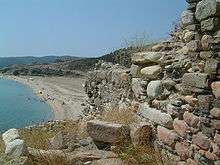
Ancient remains worth sightseeing in a strict sense are not existent. However, one may want to take a look at:
- Byzantine watch tower at Pyrgos Beach (only ruins visible)
- Ancient Mega Teichos at Vourvourou (Livari)
Agios Nikolaos is full of noteworthy beaches, as there are:
- Salonikiou Beach
- Pyrgos Beach
- Livrochio Beach
- Latoura Beach
- Lagonisi Beach
- Livari Beach
- Vourvourou Beach
- Karidi Beach
- Zografou Beach
- Galana Nera, a beach located between Diaporos and Agios Isidoros.
Beside the beaches, the bay of Vourvourou has approx. 9 islands giving it a lagoon appearance.
- Diaporos Island, largest island, partially inhabited
- Agios Isidoros, the most eastern island
All islands and islands' beaches can only be reached by boat.
References
| Wikivoyage has a travel guide for Agios Nikolaos. |
- 1 2 3 "Απογραφή Πληθυσμού - Κατοικιών 2011. ΜΟΝΙΜΟΣ Πληθυσμός" (in Greek). Hellenic Statistical Authority.
 |
Metamorfosi | Metagkitsi | Pyrgadikia |  |
| Nikiti | |
Siggitikos Golf | ||
| ||||
| | ||||
| Vourvourou | Ormos Panagias |